Sunday, October 29, 2006
Lunch and Lounging with Sammy
Sammy Mobile is a good friend. People call him Mobile because he’s always on the move. He travels throughout Kenya with a program called Rites of Passage. It’s a Christian camping and backpacking program offered to adolescents as an alternative to traditional rituals of circumcision. Often Sammy will take groups of students to climb Mount Kenya, other times he’ll lead retreats or organize conferences for young people. . . Last week Sammy took us to his church near Nairobi University and then out to lunch at a popular Kenyan restaurant. We shared a meal of boiled and fried meats, kale, and the tortilla type substance known as chipati. Chipati is a staple of the Kenyan diet and is served by itself with tea or alongside any type of meat or vegetable. The other day Sammy came over for an American dinner and we cooked him chipati pizzas. Then we played an intense game of Cranium. Amber and I won. . .
Breaking and Entering
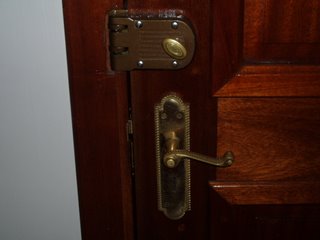
There is a lock on every door in our apartment. In addition, there are three gates, four guards, an armoured car and an iron door in between the road and our front door. For some reason, however, the previous tenants thought it also necessary to include four locks on their front door. . .Unfortunately, last Saturday one of those locks broke. So when I returned after a long day with Amber, Anne, and our friend Graham, the front door of the apartment would not open. We wrestled with lock and key for half an hour, then wandered about trying to figure out a way to get in. Graham scaled the side of the building and tried to break through a sliding glass door. Amber scrambled frantically to remember the master lock combination on a neighboring laundry room. Anne called other friends in Nairobi and solicited their advice. Meanwhile, I sought out the apartment caretaker and told him our plight. Joseph came to the door, wrestled with the key for a while, walked the perimeter and saw that all our windows were locked shut. Then he took me aside and told me “I’m sorry, it is not possible. You can no longer enter here.” I asked if there was a locksmith we could call of if there was a way to break down the door, but Joseph merely repeated, “I’m sorry, it is not possible. You can no longer enter here.” . . . At that point, however, I really needed to go to the bathroom, and our groceries were already sweating in the heat. So not entering didn’t seem like a good option. . .After some prodding we convinced Joseph to procure a ladder (note: ladders in Kenya are not like they are in America. Here they are usually made of sticks and people who climb them seem to have no idea that heights can be dangerous), and we devised a plan to break into the apartment. Joseph placed the ladder against the bricks, scaled it and balancing on his tiptoes on the top tier of the ladder pried an upper ventilation window. He reached through with a long stick, flipped open a bathroom window, leaped from his precarious position and squeezed through the narrow opening. Thus Joseph was able to enter the apartment, release the broken lock from the inside, and let us in. . . P.S. I’m moving to a new place soon. Please pray for another smooth transition.
The Great Floods of 06
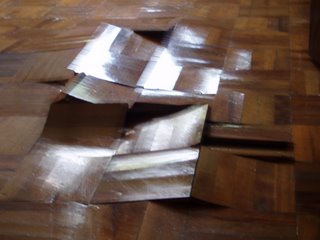
The rains have started in Nairobi. Now is the season of the light rains. The sky will be clear one moment and the next thing you know you wish you weren’t walking outside. Rain wrecks havoc on the dirt roads here creating pools of reddish brown mud. It turns the path to Akiba into an impassable puddle, and causes the marshes of Gatina to overflow, making the journey to Light and Power a treacherous trip. . .The flood I experienced recently, however, didn’t come from the rains, it came from the toilet. The plumbing overflowed three times this week. I woke up on two occasions to find a trail of water leading from the end of the hallway to the base of my bed. Fortunately the plumbing is now fixed, but the moisture has taken its toll on the floor. Most apartments in Nairobi have beautifully paneled floors with wood imported from Uganda. However, the floor basing warps easily with water. Here’s what it looks like now. . . It’s funny because earlier this summer, my basement room in Falls Church was underwater for a week. This flood wasn’t nearly as bad.
Monday, October 16, 2006
Rift Valley Academy
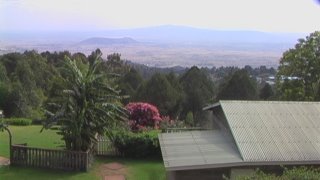
On Saturday, Amber, Anne, and I drove to Rift Valley Academy, the largest missionary boarding school in the world. We went with our friends Todd and Patsy McgGregor to watch their eldest daughter play in an intense all-day basketball tournament. RVA hosts the annual tournament and has a tradition of preparing home-made donuts for the guests. I enjoyed fresh from the oven vanilla frosted yummy goodness – my first donut in Kenya, and until next year, probably my last. On the way to RVA we saw goats, donkeys, cattle, and even a family of baboons cross the road in front of our car. Here’s a the view from the school.
Beacon of Hope Visit
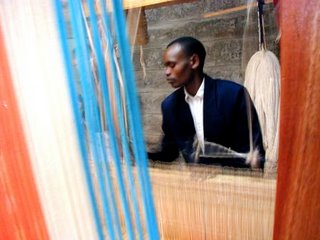
On Friday we spent the morning at Beacon of Hope in the Ongata Rongai neighborhood of Nairobi. Beacon of Hope is an all purpose Christian microenterprise, clinic, counseling center, cafeteria, and school all wrapped up into one. Beacon of Hope provides HIV testing and job opportunities for the local community and many are employed as rug weavers or sewers. Here’s a picture a friend took of one of the looms. . .They make exceptional quality hand-made rugs, kikoys, and wall-hangings. The centre also provides training in weaving and business skills, as well as an elementary school. We played with several of the young children and also went for a short trip into the neighboring slum. Several BOH volunteers led us to the home of Teresa, a single mother of four children who suffers from AIDS. We delivered a food basket and spent time praying with Teresa. She was a bit surprised by the number of mzungos but was a gracious hostess and shared some of her heartbreaking story with us in Swahili. Please pray for Teresa and her children as they struggle with poverty, disease, and the pressures of life in the slum.
Water, water, where?

There are lots of fires in Nairobi. Almost everywhere you go someone is roasting maize, cooking chipati, or burning trash along the road. The air is often filled with smoke and the scent of burnt plastic. Fire is everywhere, but sometimes water can be hard to come by. Because of the dry climate and the altitude I tend to drink a lot more water here. Unfortunately the tap water is not safe to drink, and in any case tap water shortages occur regularly. Our apartment complex was without water for about a week. Fortunately we had a bit of water stored up, but we still had to go a couple days without showers, flushing toilets, etc. . .Compared to the rural areas of Kenya, Nairobi has an abundant supply of clean water. A few years ago though the Nairobi City Council purchased a large quantity of chlorine to help purify the water supply. They learned after the fact that the chlorine vendor had sold them chalk instead of chlorine and had run off with the money.
Nairobbery
Last Tuesday was a National Holiday here in honor of former president, Daniel Arap Moi. I celebrated by spending the day poolside at the posh Muthaiga Country Club. Two of our friends from The Falls Church (Sam and Lynn Owen) are members there and have a wonderful ministry working with government and business leaders in Kenya. During the afternoon I met the police commissioner of Kenya along with several other Kenyan noteables. I also encountered a fellow Mary Washington College alumnus who works on food security in Northern Kenya. After visiting the club, Lynn gave us a ride back to the apartment. On the way our car slowed briefly at a roundabout as the vehicle prepared to enter traffic. As we inched forward a man ran up to our car, ripped the side view mirror off, stuck it under his jacket and walked off into traffic. . . Apparently such robberies are quite common in Nairobi. In one particular neighborhood, drivers often return to their cars after spending a half hour or so in a store to find their parked cars completely stripped of parts by local mechanics/thiefs. Thankfully, I don’t have to worry about owning or driving a car here :)
Friends at a Computer School

Here’s a picture of my friend Jackson Wanga (on the left) and some of his students at Elishadai Computer School. We’ve spent a few days visiting with Jackson and hearing about his life and work at the school. Jackson grew up in the Kibera slum and has a heart for reaching out to young people in the slums and providing education, opportunity, and hope to the poor.
Thursday, October 12, 2006
An Oasis En Route to Limuru

St. Julian’s Centre is a former dairy farm in the highlands of Kenya. It now serves as a guesthouse and a place of rest and refreshment. It is run by some of our friends from the Anglican Church and we visited them on Sunday, attended a service at their chapel, enjoyed a delicious brunch, and played several matches of volleyball. People here love to play volleyball. Next to soccer it seems to be the most popular sport in Kenya.
A Graduation Celebration
Last week Teacher Daniel invited me to attend a graduation ceremony for his wife, Zipporah. Daniel is an instructor at the Akiba school and has become a good friend. On Friday, I piled into the school van with Daniel and Zippy’s families and we drove together to Karen. The town of Karen was named for Karen Blixen (from Out of Africa) and is a suburb of Nairobi filled with coffee farms and tea plantations. Thousands of families from all over Kenya gathered for the graduation ceremony on the campus of the Catholic University of East Africa. It was a spectacular event with many guest speakers and hundreds of vendors hawking Fanta Sodas along with all types of graduation memorabilia. After the ceremony we sped back to Teacher Daniel’s house for a feast and a traditional Kikuyu celebration. Anne and Amber joined us for some songs and here’s a short clip of the group singing in Kikuyu (check back soon for the video link, it's taking a while to upload).
Thursday, October 05, 2006
A Day at Akiba

Here’s a picture of Anne being mobbed by primary students at the Akiba School. We visited the school yesterday, met with teachers and faculty, and sat in on several classes. I attended a KiSwahili class, a biology class, and a computer studies course. The Headmaster has asked if I could help teach 3 sections of computer skills starting next week! We’re still working out our schedules, but it looks like I will teach at Akiba several mornings a week through December. The computer classes will focus mainly on keyboarding and Microsoft Word and Excel for Form 1 and Form 2 students (high school freshman and sophomores).
Free primary education was instituted in Kenya a few years ago, but the average student-teacher ratio in public schools is 80 to 1. Many families in the slums cannot “afford” free education because students are required to purchase uniforms and bring their own desks. In addition, parents are reluctant to forfeit the money their children could make from begging during the day. The public school facilities here are atrocious and Akiba offers a strong alternative by providing small class sizes, excellent teachers, and a quality Christian education.
The students at Akiba come from a variety of economic backgrounds, but all of them would be considered poor by American standards. Many live in the neighboring slums of Kangemi, Kawangware, or Sodom (named for its reputation as a hotbed of criminal activity at night). Some of the students pay their own school fees while others receive sponsorships. Ten students are actually orphans and former street children who stay in a small apartment at the school with a caretaker. . .In general, the students here are very disciplined and seem to be quite bright, hardworking, and eager to learn. Education is seen as an opportunity to escape poverty and students take their studies very seriously. Please pray for the graduating classes as they study for their National Exams this week. Performance on the exams is a big factor in determining college and trade school admissions as well as the availability of job opportunities.
At the Market
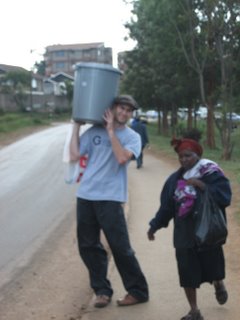
Our new home is about 2 kilometers from the Sarit Centre, a western style shopping mall with all sorts of stores and restaurants. On Tuesday, Amber, Anne, and I visited the Uchumwi supermarket and purchased a variety of household goods, including many mangoes, avocados, and several types of yogurt. Here I am trying to carry some of the groceries home in a makeshift basket.
A New Home


The past week or so Amber, Anne, and I have been walking around the city looking at housing options and trying to find furniture. I’ve been surprised by the number of new apartment buildings in Nairobi. Construction projects are everywhere, and there has been substantial economic growth and a dramatic increase in the middle class since the last time I was here. . . With the advice of Sam and Lynn Owen we’ve been able to find a very nice apartment complex in a secure location and at a reasonable price. Here’s the view from my window, and a shot of the shared dining room. The apartment came completely unfurnished so we bought a refrigerator the other day and have been visiting furniture dukas on the side of the road to find inexpensive but well-crafted hardwood and iron furniture.
Sunday, October 01, 2006
We made it!
On Monday night, we were whisked away from the airport with a midnight minivan ride through Nairobi. Our driver, Gabriel, brought us to a beautiful guesthouse in the Westlands area of Nairobi (I'll post pictures soon). We've been staying there with a group of Kenyans as well as missionaries from throughout Kenya and Sudan. This past week we looked for housing, visited with several friends, set up cell phone service, and were amazed by the wonderful hospitality of Kenyans and the beauty of the land.
Subscribe to:
Posts (Atom)
